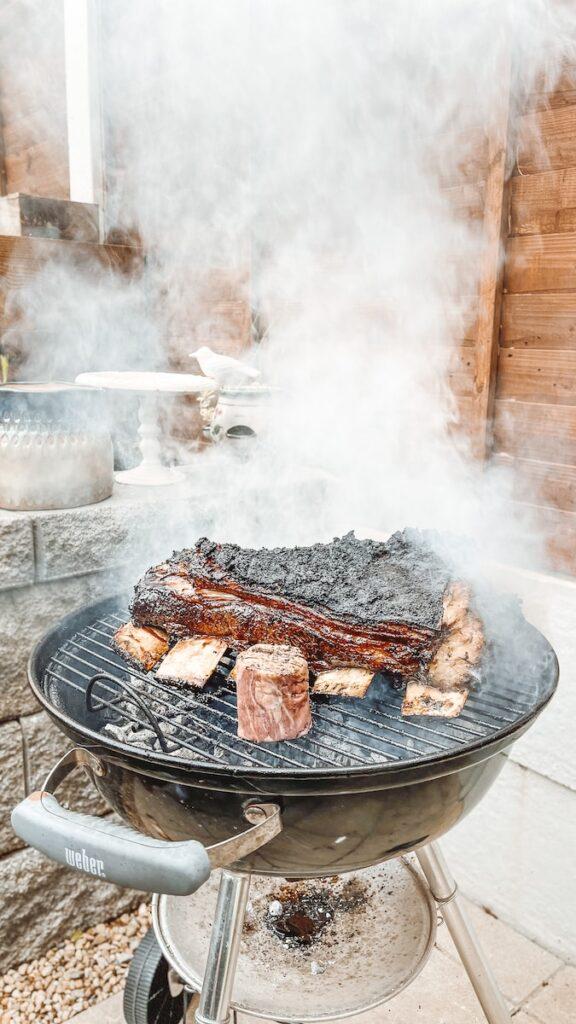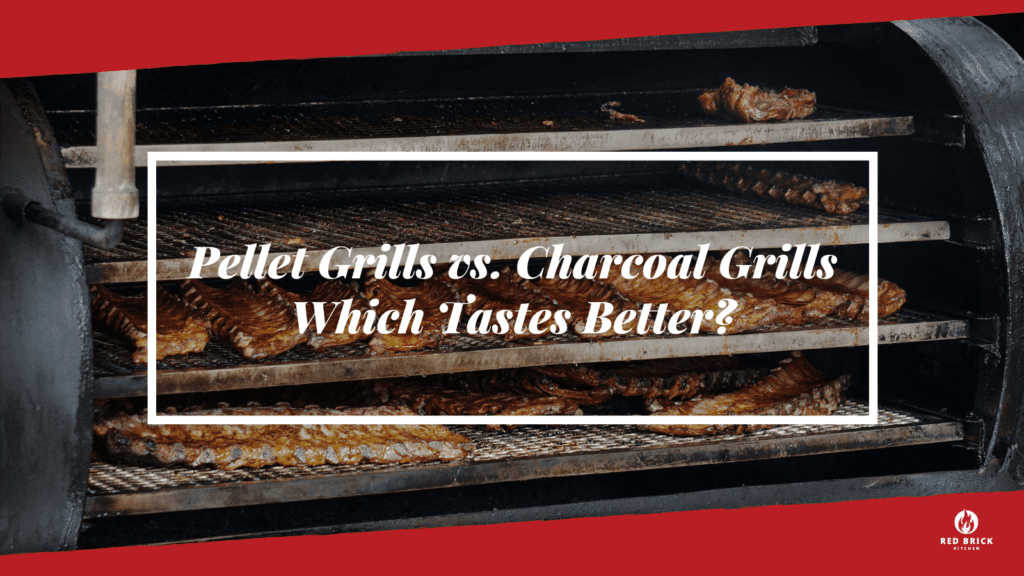Pellet Grills vs Charcoal Grills: The Flavor Showdown
Grilling, a beloved outdoor cooking tradition, unites friends and family around flavorsome feasts. But a lively debate lingers in the air: Do pellet grills surpass charcoal grills in taste? In this exploration, we uncover the unique flavors, advantages, and caveats of pellet and charcoal grills. Whether you’re a seasoned grillmaster or an aspiring cook, join us in the quest for the ultimate grill flavor.
Benefits of Pellet Grills
1. Temperature Control
One significant advantage of pellet grills vs charcoal grills is their ability to maintain a consistent temperature. These grills come with electronic controls that allow you to easily set the desired temperature. The grill then automatically adjusts the pellet feed rate to maintain the chosen temperature, ensuring your food cooks evenly.
2. Ease of Use
Pellet grills are remarkably easy to use, making them a favorite among beginners and experienced grillers alike. They come with hopper systems where you load wood pellets, and the grill takes care of the rest. With just a push of a button, the grill ignites the pellets, and you’re ready to start cooking.
3. Smoke Flavor
Pellet grills offer a unique smoky flavor to your food. While charcoal grills produce a robust smokiness, pellet grills allow you to create a more nuanced and controlled smoke profile. By using different wood pellet flavors, you can achieve various smoke tastes, enhancing the overall flavor of your grilled dishes.
Drawbacks of Pellet Grills
While pellet grills offer many advantages, they also have some drawbacks of pellet grills vs charcoal grills to consider:
1. Complexity
The technology that makes pellet grills convenient also adds complexity. Electronic components can malfunction, and you might need specialized knowledge to troubleshoot and repair them.
2. Dependency on Electricity
Pellet grills require electricity to operate their fans and augers, which feed the wood pellets into the fire. If you lose power, you won’t be able to use your pellet grill.
Advantages of Charcoal Grills
Charcoal grills have their own set of advantages that make them a popular choice among barbecue enthusiasts. One of the main advantages is the authentic smoky flavor that they impart onto the food. The use of charcoal briquettes or lump charcoal creates a distinct taste that many people associate with traditional barbecue. The smoke produced by charcoal can enhance the taste of meats, imparting a rich and smoky flavor profile.
Drawbacks of Charcoal Grills
Charcoal grills, while beloved for their flavor, also come with some drawbacks:
1. Uneven Heat Distribution
Charcoal grills can often have hotspots, resulting in uneven heat distribution. This can lead to inconsistent cooking and potentially burnt or undercooked food. Achieving even heat with charcoal requires skill and practice.
2. Difficult to Clean
Charcoal grills produce ash and soot, making them messier and more challenging to clean compared to pellet grills. Ash removal and charcoal disposal can be time-consuming and require extra effort.
Pellet Grills vs Charcoal Grills: Cost Comparison
Initial Price of Pellet Grills vs Charcoal Grills
Charcoal grills tend to be more affordable upfront compared to pellet grills. A basic charcoal grill can be purchased for as little as $50, while high-end models can range up to a few hundred dollars. On the other hand, pellet grills usually start at around $400, with premium models reaching into the thousands.
Pellet Grills vs Charcoal Grills, Cost of Use:
In terms of ongoing costs, charcoal grills have an advantage. Charcoal briquettes are inexpensive and widely available, making them a cost-effective fuel source. Additionally, charcoal grills tend to consume less fuel compared to pellet grills. Pellet grills require wood pellets as fuel, which can be more expensive and may not be as readily accessible in some areas.

Pellet Grills vs Charcoal Grills: Cleaning & Maintenance
Pellet Grills:
Pellet grills generally require less cleaning and maintenance compared to charcoal grills. With a pellet grill, the ashes and residues are automatically collected in a removable drip tray, making cleanup a breeze. The drip tray can be easily emptied and wiped clean. Additionally, pellet grills often have non-stick grates, reducing the chance of food sticking and making it easier to clean them after use.
Charcoal Grills:
Charcoal grills require more maintenance and cleaning. After each use, the ashes and coals need to be properly disposed of, and the grill grates should be cleaned to prevent build-up and ensure optimal performance. This process can be time-consuming and may require additional tools like a grill brush and ash disposal system. However, some barbecue enthusiasts enjoy the ritual of cleaning and maintaining their charcoal grills as it adds to the overall experience of using them.
Wood Pellet Flavor Profiles
Experiment with various wood pellet flavors to customize your grilled dishes’ taste:
- Oak: Mild and versatile.
- Hickory: Strong smokiness for pork and beef.
- Maple: Sweet and fruity.
- Apple: Mild and sweet for pork, poultry, and fish.
- Cherry: Rich and sweet for poultry, pork, or lamb.
- Mesquite: Intense and distinctive for beef or game meats.
Charcoal Combinations
Enhance charcoal-grilled food with different charcoal combinations:
- Lump Charcoal: Authentic smokiness and quick grilling.
- Flavored Briquettes: Infused with mesquite or hickory for added taste.
Pellet Grill Safety
Ensure proper ventilation and prevent carbon monoxide exposure when using pellet grills. Operate them in well-ventilated areas.
Smoke Ring Comparison
Charcoal grills produce a more pronounced smoke ring due to intense smoke production. However, the taste is equally important.
Conclusion: A Personal Preference for Pellet-Grilled Food
In the end, the choice between pellet grills and charcoal grills is deeply personal. Pellet grills offer the convenience of precise temperature control, ease of use, and the ability to experiment with a variety of wood pellet flavors to craft unique tastes.
For me, the versatility and convenience of pellet grills, not to mention the tantalizing smoky flavors they impart, make them a top pick for outdoor cooking. However, many die-hard barbecue enthusiasts swear by the rich, authentic taste that charcoal grills bring to the table.
Ultimately, the decision boils down to your individual preferences, budget, and the kind of grilling experience you seek. Whichever grill you choose, remember to grill safely, savor the moments, and enjoy the mouthwatering results.
FAQs: Pellet Grills vs Charcoal Grills
How do pellet grills compare to charcoal grills in terms of taste?
Pellet grills tend to offer a more consistent and controlled flavor profile compared to charcoal grills. The smoke produced by pellet grills is typically lighter and more subtle, allowing the natural flavors of the food to shine through.
Do pellet grills provide a smoky flavor like charcoal grills?
While pellet grills may not produce as heavy of a smoke flavor as charcoal grills, they still impart a delicious smoky taste. The type of wood pellets used in the pellet grill can also influence the overall flavor profile, allowing for a variety of options to suit personal preferences.
Is it easier to maintain a consistent temperature with pellet grills?
Yes, one of the key advantages of pellet grills is their ability to maintain a steady temperature throughout the cooking process. The automated temperature control system ensures that the grill stays at the desired temperature, resulting in evenly cooked and delicious food.
Are pellet grills more expensive than charcoal grills?
In general, pellet grills tend to have a higher initial price compared to charcoal grills. However, it’s important to consider the long-term cost of use, as pellet grills often use fewer pellets than charcoal grills use charcoal. This can result in cost savings over time.
Can pellet grills be used for traditional barbecue (BBQ) cooking?
Absolutely! Pellet grills are versatile and can be used for a wide range of cooking styles, including traditional BBQ. They offer consistent temperature control and the ability to add smoky flavors, making them a great choice for BBQ enthusiasts.
Last updated: September 29, 2023


